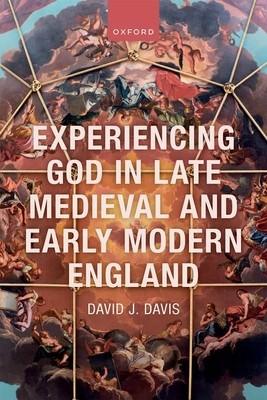
- We will send in 10–14 business days.
- Author: David J Davis
- Publisher: Oxford University Press, USA
- ISBN-10: 0198834136
- ISBN-13: 9780198834137
- Format: 16.3 x 24 x 2.1 cm, kieti viršeliai
- Language: English
- SAVE -10% with code: EXTRA
Experiencing God in Late Medieval and Early Modern England (e-book) (used book) | bookbook.eu
Reviews
Description
Experiencing God in Late Medieval and Early Modern England demonstrates that experiences of divine revelation, both biblical and contemporary, were central to late medieval and early modern English religion. The book sheds light on previously under-explored notions about divine revelation and the role these notions played in shaping large portions of English thought and belief. Bringing together a wide variety of source materials, from contemplative works and accounts of revelatory experiences to biblical commentaries, devotionals, and religious imagery, David J. Davis argues that in the period there was a collective representation of divine revelation as a source of human knowledge, which transcended other religious and intellectual divisions. Not only did most people think that divine revelation, through a ravishing encounter with God, was possible, but also divine revelation was understood to be the pinnacle of religious experience and a source of pure understanding. The bookhighlights a common discourse running through the sources that underpinned this collective representation of how human beings experienced the divine, and it demonstrates a continual effort across large swathes of English religion to prepare an individual's soul for an encounter with the divine, through different spiritual disciplines and devotional practices. Over a period of several centuries this discourse and the larger culture of revelation provided an essential structure and legitimacy both to contemporary claims of divine revelation and the biblical precedents that contemporary experiences were modelled after. This discourse detailed the physical, metaphysical, and epistemological features of how a human being was understood to experience divine revelation, providing a means to delimit and define what happened when an individual was rapture by God. Finally, the book situates the experience of revelation within the wider context of knowledge and identifies the ways that claims to
divine revelation were legitimated as well as stigmatized based on this common understanding of the experience of rapture.
EXTRA 10 % discount with code: EXTRA
The promotion ends in 22d.07:08:28
The discount code is valid when purchasing from 10 €. Discounts do not stack.
- Author: David J Davis
- Publisher: Oxford University Press, USA
- ISBN-10: 0198834136
- ISBN-13: 9780198834137
- Format: 16.3 x 24 x 2.1 cm, kieti viršeliai
- Language: English English
highlights a common discourse running through the sources that underpinned this collective representation of how human beings experienced the divine, and it demonstrates a continual effort across large swathes of English religion to prepare an individual's soul for an encounter with the divine, through different spiritual disciplines and devotional practices. Over a period of several centuries this discourse and the larger culture of revelation provided an essential structure and legitimacy both to contemporary claims of divine revelation and the biblical precedents that contemporary experiences were modelled after. This discourse detailed the physical, metaphysical, and epistemological features of how a human being was understood to experience divine revelation, providing a means to delimit and define what happened when an individual was rapture by God. Finally, the book situates the experience of revelation within the wider context of knowledge and identifies the ways that claims to
divine revelation were legitimated as well as stigmatized based on this common understanding of the experience of rapture.


Reviews